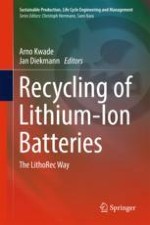2018 | OriginalPaper | Chapter
16. Environmental Aspects of the Recycling of Lithium-Ion Traction Batteries
Authors : Felipe Cerdas, Stefan Andrew, Sebastian Thiede, Christoph Herrmann
Published in: Recycling of Lithium-Ion Batteries
Publisher: Springer International Publishing
Activate our intelligent search to find suitable subject content or patents.
Select sections of text to find matching patents with Artificial Intelligence. powered by
Select sections of text to find additional relevant content using AI-assisted search. powered by
